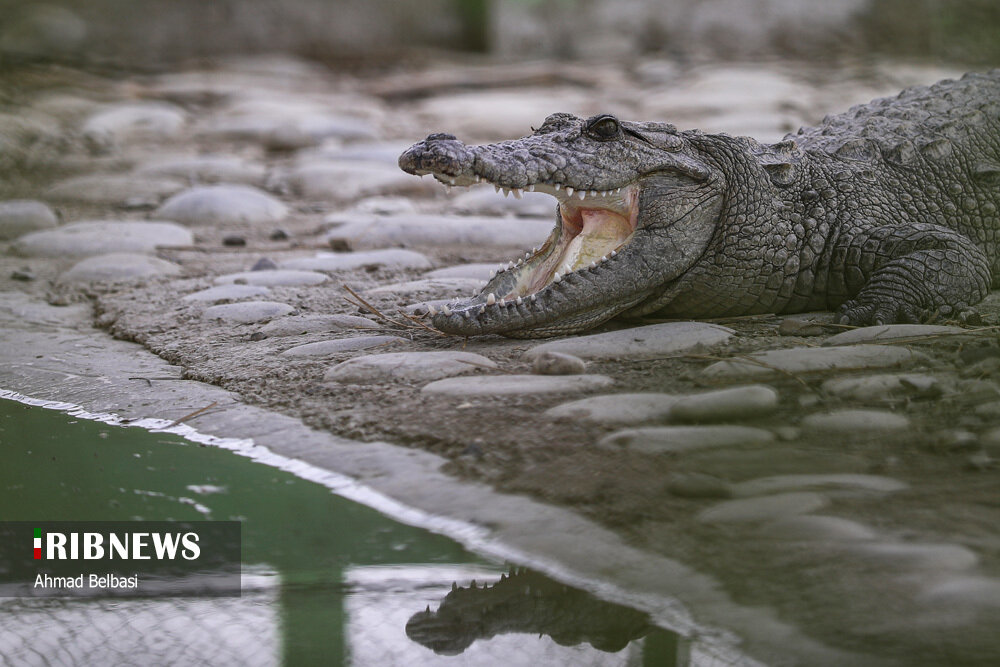Gando: the only crocodile native to Iran

TEHRAN – The mugger crocodile, also called Gando in Iran, is a crocodilian native to freshwater habitats of the southeastern province of Sistan-Baluchestan.
The broad-snouted crocodile was also native to the Indian subcontinent, which is extinct in Bhutan and Myanmar and has been listed as Vulnerable on the IUCN Red List since 1982.
In English, the species is called Mugger, which is rooted in Hindi meaning sea monster, but the locals of southern Iran have chosen the name “Gando” for this large reptile, which in Balochi means walking on the belly.
Gando, one of the tourist attractions in the Chabahar Free Zone, is the only crocodile native to Iran and the largest reptile in the country.
It is interesting to know that the species is one of the rarest in the world and has a shorter snout than other similar species, which can be a valuable potential for attracting tourists and preserving wildlife in Iran.
“Wherever Gando is, there is plenty of water” is a common belief in southern regions of Sistan-Baluchestan, as they consider the animal as a symbol of blessing and prosperity and believe that with the migration and death of this animal, drought and famine will overshadow their lives.
Bahu Kalat and Sarbaz villages in Sistan-Baluchestan province have turned into a tourist attraction for their rare species of crocodiles found in Iran.
On the Iranian Makran coast near Chabahar lives a population of around 200 mugger crocodiles. Due to human activity and a long drought in the late 1990s and early 2000s, it had been pushed to the brink of extinction. Following several tropical cyclones in 2007 and 2010, much of the habitat of the mugger crocodiles has been restored as formerly dry lakes and hamouns were flooded again.
Although the crocodile is a very intelligent and shy species, it is, therefore, difficult to observe directly, so given the high probability of not being observed by census teams, the estimated number of this species in the region is twice the number observed about 400 crocodiles.
Climate change a major threat to rare crocodile of Iran
Asghar Mobaraki, a member of the crocodile group of the International Union for Conservation of Nature (IUCN) said that climate change is a major threat to mugger crocodile, as the animal gender is related to nest temperature, not genetics. So, the increase in temperature makes this species unisexual.
In fact, the population proportion is unequaled and this situation is a disaster in terms of population growth, he lamented.
Pointing to the decrease in rainfall in recent years and water shortages in some habitats and ponds, he said that therefore, the protection of crocodiles requires more attention to natural habitats and the implementation of special management programs.
Habitat destruction for agricultural purposes, improper water withdrawal by pumping and digging canals, various chemical contaminants such as pesticides, herbicides, fungicides, motor oils, and detergents can be catastrophic and directly or indirectly endanger their offspring, he also said.
Some crocodiles are also threatened on the routes due to car accidents.
Human conflicts
The mugger crocodile might be potentially dangerous to humans. But, during the mating season, the animal is sensitive to humans. Fatal attacks have been reported, though less frequently than by saltwater and Nile crocodiles.
Human victims are dragged into the water and drowned but are rarely consumed. Each year, several attacks of muggers on humans are reported in southern Iran.
As water scarcity is hitting the Sistan-Baluchestan province, children or adult locals get near the muggers’ habitat to get water and the animal defends his habitat by attacking the locals.
Attacks out of the water are unlikely- the element of surprise is lost because most of them cannot move fast on the land. But some meetings are harmful especially for children.
Since large muggers occasionally take livestock, this leads to conflict with local people living close to the mugger habitat.
FB/MG
Leave a Comment